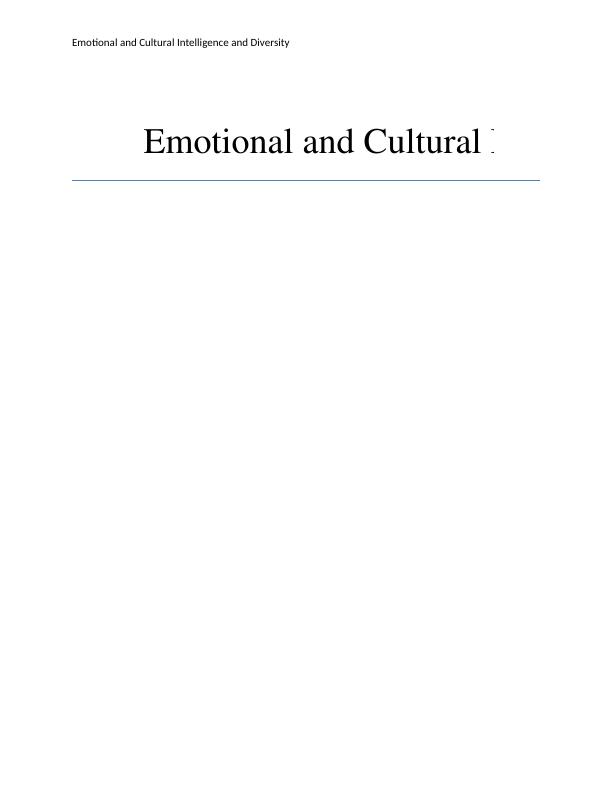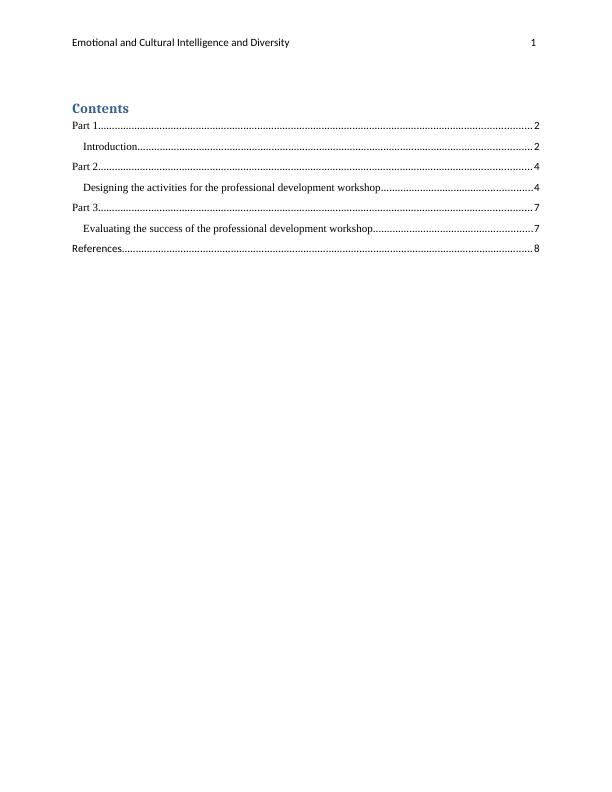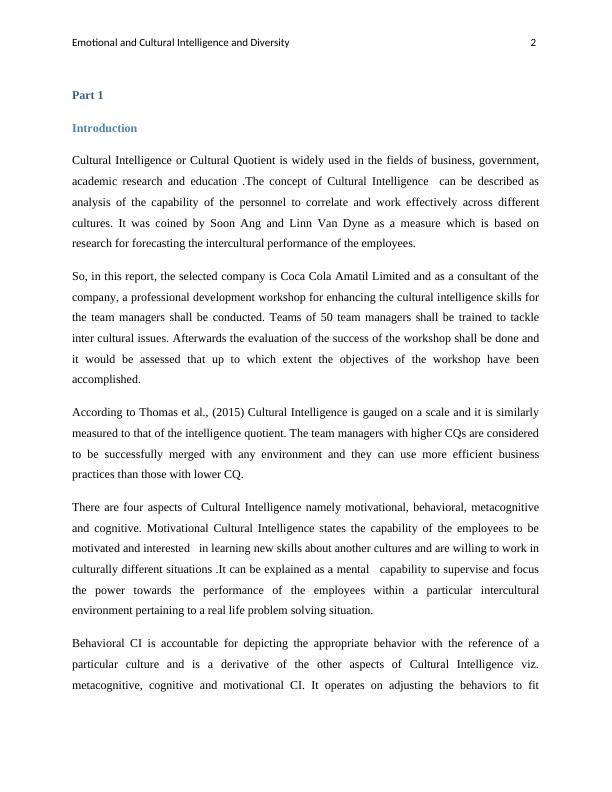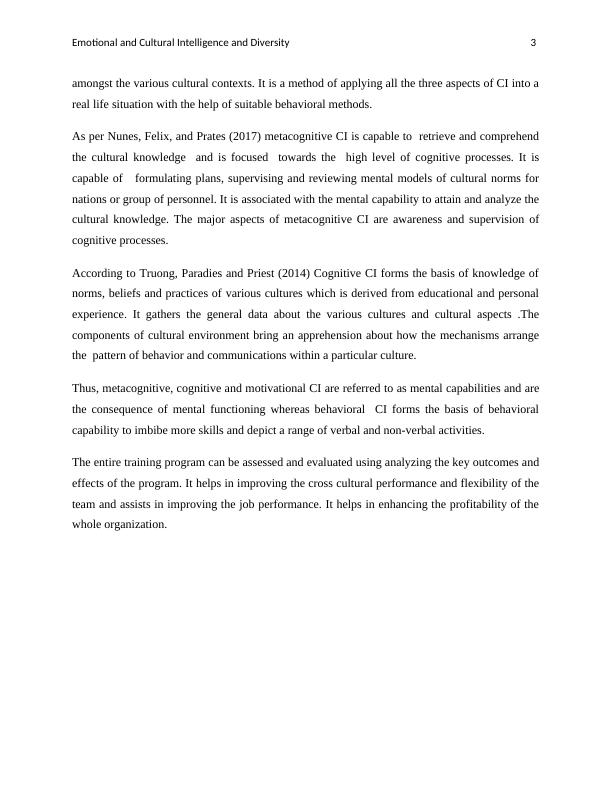Emotional and Cultural Intelligence and Diversity
Added on 2023-06-11
11 Pages2825 Words225 Views
Emotional and Cultural Intelligence and Diversity

Emotional and Cultural Intelligence and Diversity 1
Contents
Part 1...........................................................................................................................................................2
Introduction.............................................................................................................................................2
Part 2...........................................................................................................................................................4
Designing the activities for the professional development workshop......................................................4
Part 3...........................................................................................................................................................7
Evaluating the success of the professional development workshop.........................................................7
References...................................................................................................................................................8
Contents
Part 1...........................................................................................................................................................2
Introduction.............................................................................................................................................2
Part 2...........................................................................................................................................................4
Designing the activities for the professional development workshop......................................................4
Part 3...........................................................................................................................................................7
Evaluating the success of the professional development workshop.........................................................7
References...................................................................................................................................................8

Emotional and Cultural Intelligence and Diversity 2
Part 1
Introduction
Cultural Intelligence or Cultural Quotient is widely used in the fields of business, government,
academic research and education .The concept of Cultural Intelligence can be described as
analysis of the capability of the personnel to correlate and work effectively across different
cultures. It was coined by Soon Ang and Linn Van Dyne as a measure which is based on
research for forecasting the intercultural performance of the employees.
So, in this report, the selected company is Coca Cola Amatil Limited and as a consultant of the
company, a professional development workshop for enhancing the cultural intelligence skills for
the team managers shall be conducted. Teams of 50 team managers shall be trained to tackle
inter cultural issues. Afterwards the evaluation of the success of the workshop shall be done and
it would be assessed that up to which extent the objectives of the workshop have been
accomplished.
According to Thomas et al., (2015) Cultural Intelligence is gauged on a scale and it is similarly
measured to that of the intelligence quotient. The team managers with higher CQs are considered
to be successfully merged with any environment and they can use more efficient business
practices than those with lower CQ.
There are four aspects of Cultural Intelligence namely motivational, behavioral, metacognitive
and cognitive. Motivational Cultural Intelligence states the capability of the employees to be
motivated and interested in learning new skills about another cultures and are willing to work in
culturally different situations .It can be explained as a mental capability to supervise and focus
the power towards the performance of the employees within a particular intercultural
environment pertaining to a real life problem solving situation.
Behavioral CI is accountable for depicting the appropriate behavior with the reference of a
particular culture and is a derivative of the other aspects of Cultural Intelligence viz.
metacognitive, cognitive and motivational CI. It operates on adjusting the behaviors to fit
Part 1
Introduction
Cultural Intelligence or Cultural Quotient is widely used in the fields of business, government,
academic research and education .The concept of Cultural Intelligence can be described as
analysis of the capability of the personnel to correlate and work effectively across different
cultures. It was coined by Soon Ang and Linn Van Dyne as a measure which is based on
research for forecasting the intercultural performance of the employees.
So, in this report, the selected company is Coca Cola Amatil Limited and as a consultant of the
company, a professional development workshop for enhancing the cultural intelligence skills for
the team managers shall be conducted. Teams of 50 team managers shall be trained to tackle
inter cultural issues. Afterwards the evaluation of the success of the workshop shall be done and
it would be assessed that up to which extent the objectives of the workshop have been
accomplished.
According to Thomas et al., (2015) Cultural Intelligence is gauged on a scale and it is similarly
measured to that of the intelligence quotient. The team managers with higher CQs are considered
to be successfully merged with any environment and they can use more efficient business
practices than those with lower CQ.
There are four aspects of Cultural Intelligence namely motivational, behavioral, metacognitive
and cognitive. Motivational Cultural Intelligence states the capability of the employees to be
motivated and interested in learning new skills about another cultures and are willing to work in
culturally different situations .It can be explained as a mental capability to supervise and focus
the power towards the performance of the employees within a particular intercultural
environment pertaining to a real life problem solving situation.
Behavioral CI is accountable for depicting the appropriate behavior with the reference of a
particular culture and is a derivative of the other aspects of Cultural Intelligence viz.
metacognitive, cognitive and motivational CI. It operates on adjusting the behaviors to fit

Emotional and Cultural Intelligence and Diversity 3
amongst the various cultural contexts. It is a method of applying all the three aspects of CI into a
real life situation with the help of suitable behavioral methods.
As per Nunes, Felix, and Prates (2017) metacognitive CI is capable to retrieve and comprehend
the cultural knowledge and is focused towards the high level of cognitive processes. It is
capable of formulating plans, supervising and reviewing mental models of cultural norms for
nations or group of personnel. It is associated with the mental capability to attain and analyze the
cultural knowledge. The major aspects of metacognitive CI are awareness and supervision of
cognitive processes.
According to Truong, Paradies and Priest (2014) Cognitive CI forms the basis of knowledge of
norms, beliefs and practices of various cultures which is derived from educational and personal
experience. It gathers the general data about the various cultures and cultural aspects .The
components of cultural environment bring an apprehension about how the mechanisms arrange
the pattern of behavior and communications within a particular culture.
Thus, metacognitive, cognitive and motivational CI are referred to as mental capabilities and are
the consequence of mental functioning whereas behavioral CI forms the basis of behavioral
capability to imbibe more skills and depict a range of verbal and non-verbal activities.
The entire training program can be assessed and evaluated using analyzing the key outcomes and
effects of the program. It helps in improving the cross cultural performance and flexibility of the
team and assists in improving the job performance. It helps in enhancing the profitability of the
whole organization.
amongst the various cultural contexts. It is a method of applying all the three aspects of CI into a
real life situation with the help of suitable behavioral methods.
As per Nunes, Felix, and Prates (2017) metacognitive CI is capable to retrieve and comprehend
the cultural knowledge and is focused towards the high level of cognitive processes. It is
capable of formulating plans, supervising and reviewing mental models of cultural norms for
nations or group of personnel. It is associated with the mental capability to attain and analyze the
cultural knowledge. The major aspects of metacognitive CI are awareness and supervision of
cognitive processes.
According to Truong, Paradies and Priest (2014) Cognitive CI forms the basis of knowledge of
norms, beliefs and practices of various cultures which is derived from educational and personal
experience. It gathers the general data about the various cultures and cultural aspects .The
components of cultural environment bring an apprehension about how the mechanisms arrange
the pattern of behavior and communications within a particular culture.
Thus, metacognitive, cognitive and motivational CI are referred to as mental capabilities and are
the consequence of mental functioning whereas behavioral CI forms the basis of behavioral
capability to imbibe more skills and depict a range of verbal and non-verbal activities.
The entire training program can be assessed and evaluated using analyzing the key outcomes and
effects of the program. It helps in improving the cross cultural performance and flexibility of the
team and assists in improving the job performance. It helps in enhancing the profitability of the
whole organization.

End of preview
Want to access all the pages? Upload your documents or become a member.
Related Documents
A Professional Development.lg...
|10
|571
|22
LEARNING OUTCOME OF THE WORKSHOP.lg...
|3
|379
|2
Cultural Intelligence: Assignmentlg...
|8
|660
|50
Critical Review on Cultural Intelligence in Cross Cultural Managementlg...
|21
|6764
|33
Aspects of Emotional Intelligence: Self Awareness, Self Regulation, and Empathylg...
|7
|1562
|48
Skills Acquired Through General Education Courseslg...
|3
|659
|378